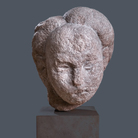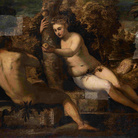58th International Art Exhibition – La Biennale di Venezia. Croatian Pavilion - Igor Grubić. Traces of Disappearing (In Three Acts)

© Igor Grubić | Igor Grubić, Traces of Disappearing (Deconstruction of the Factory), 2006-2019. Photo essay (detail)
Dal 11 May 2019 al 24 November 2019
Venezia
Luogo: Venue
Indirizzo: Calle della Regina
Orari: 10 am-6 pm. Closed on Mondays except on: 13 May, 2 September, 18 November 2019
Curatori: Katerina Gregos
Sito ufficiale: http://www.croatianpavilion-venicebiennale.hr
Igor Grubić’s project for the Biennale, Traces of Disappearing in Three Acts (2006-2019), is thirteen years in the making. It consists of three inter-related photo essays and an animated film, set in a specially designed mise-en-scène. The project began in 2006 when the artist began documenting post-war, transitional reality in Croatia, particularly the fundamental shift from socialism to capitalism, from a central, stated-planned to a free market economy. It explores how this has affected changes in habitation, the urban fabric, public space and social relations.
Wild House, the first chapter or ‘Act’, examines changes in homes, living and public space with the privatisation of property and the consolidation of neo-liberalism in the country; Filigree Sidewalk (Act II), looks into traditional vocations such as local handcrafts and specialist workshops, highlighting which professions survive and which not in the new economic circumstances. Finally, Deconstruction of the Factory (Act III) presents a series of defunct factories, monumental reminders of the transition from industry to post-industry, and changing conditions of work. The latter also become the setting for Grubić’s short film, How Steel was Tempered, which weaves together issues of worker history, family bonds and generational shifts, suggesting also the importance of fruitful future relationships based on solidarity, shared social space and creative, collaborative working. The film has already received four awards. A newly edited version will be presented in Venice for the first time.
Grubić’s project sits firmly in the humanist dimension of documentary photography, bridging together poetics, politics and social reality. The project for the Biennale expands his already significant contribution into socially committed documentary work, and the preservation of the memory of Croatia’s architectural history, work and culture. Its scope is local but also ecumenical, analysing as it does the changes engendered by globalization, privatisation and the consolidation of neo-liberalism. Finally, it highlights the new situations that are coming to replace the old, while subtly inviting us to think about future ways of imagining – and inhabiting - our world.
Igor Grubić (b. 1969, Zagreb) is one of Croatia’s most accomplished and internationally acclaimed artists. His work includes site-specific interventions in public spaces, photography, and film. Since 2000 he is also working as a producer and author of documentaries, TV reportages and socially committed commercials. Exhibitions include, among others: Tirana Biennial 2 (2003); Manifesta 4 (Frankfurt, 2002); Manifesta 9 (Genk, 2012); 50.October Salon (Belgrade, 2009); Gender Check, MuMOK (Vienna, 2009); 11.Istanbul Biennial (2009); 4.Fotofestival Mannheim Ludwigshafen, Heidelberg (2011); East Side Stories, Palais de Tokyo (Paris, 2012); Gwangju Biennale (2014); Zero Tolerance, MOMA PS1 (New York 2014); Degrees of Freedom, MAMbo (Bologna, 2015); 5th Thessaloniki Biennial (2015); Cut / Rez, MSU (Zagreb, 2018); Heavenly creatures, MG+MSUM (Ljubljana, 2018); The Value of Freedom, Belvedere 21 (Vienna, 2018). Grubić is represented by Laveronica arte contemporanea, Modica, Sicily.
Katerina Gregos is an independent curator, art historian and writer based in Brussels. She has curated numerous large-scale international exhibitions and biennials, including, among others: the 1st Riga Biennial, Everything Was Forever Until It Was No More (2018); the 5th Thessaloniki Biennial, Between the Pessimism of the Intellect and the Optimism of the Will (2015); Göteborg Biennial, The Politics of Play (2013); Manifesta 9, In the Deep of the Modern, Genk (2012). She has also curated two critically acclaimed national pavilions at the Venice Biennale: Belgium (2015) and Denmark (2011). Since 2016 Gregos is also curator of the non-profit, Munich-based Schwarz Foundation, for which she recently curated the exhibition Anatomy of Political Melancholy, at the Athens Conservatoire (2019).
A book with essays by Katerina Gregos and WHW designed by Rafaela Dražić is being produced for the occasion. The publication is supported by Kontakt Collection, Vienna.
SCARICA IL COMUNICATO IN PDF
COMMENTI

-
 Dal 20 February 2026 al 19 July 2026
Roma | Mercati di Traiano Museo dei Fori Imperiali
Dal 20 February 2026 al 19 July 2026
Roma | Mercati di Traiano Museo dei Fori Imperiali
Constantin Brâncuși. Le origini dell’Infinito
-
 Dal 18 February 2026 al 19 July 2026
Padova | Centro Culturale Altinate | San Gaetano
Dal 18 February 2026 al 19 July 2026
Padova | Centro Culturale Altinate | San Gaetano
M.C. ESCHER. Tutti i capolavori
-
 Dal 14 February 2026 al 31 May 2026
Parma | Palazzo Tarasconi
Dal 14 February 2026 al 31 May 2026
Parma | Palazzo Tarasconi
Impressionisti: 100 anni di riflessi. Gli Impressionisti da Monet a Bonnard
-
 Dal 14 February 2026 al 16 April 2026
Ancona | Pinacoteca Civica Francesco Podesti
Dal 14 February 2026 al 16 April 2026
Ancona | Pinacoteca Civica Francesco Podesti
TIZIANO VECELLIO E LORENZO LOTTO. Due capolavori del Rinascimento alla Pinacoteca Civica di Ancona per due mostre studio
-
 Dal 12 February 2026 al 14 June 2026
Roma | Galleria Nazionale d’Arte Antica in Palazzo Barberini
Dal 12 February 2026 al 14 June 2026
Roma | Galleria Nazionale d’Arte Antica in Palazzo Barberini
BERNINI E I BARBERINI
-
 Dal 11 February 2026 al 7 June 2026
Venezia | Gallerie dell’Accademia
Dal 11 February 2026 al 7 June 2026
Venezia | Gallerie dell’Accademia
Tintoretto racconta la genesi. Ricerca, analisi e restauro


